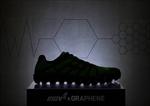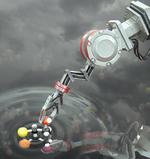Other

“Scientists have a developed a new nanocomposite material that boosts battery life and improves the performance of everyday gadgets such as smartphones, tablets and laptops. Working with researchers from Henan Polytechnic University in China, scientists from The University of Manchester …

“A University of Manchester partnership is launching a revolutionary world-first in the sports footwear market following a unique collaboration with graphene experts. British sportswear brand inov-8 has teamed up with The University of Manchester to become the first-ever company to …

“A team of scientists have created a new generation of tiny remote controlled nanorobots which could one day allow doctors to diagnose disease and deliver drugs from within the human body. The team led by Professor Li Zhang from the …

“Manchester scientists use graphene water filter to turn whisky clear Previously graphene-oxide membranes were shown to be completely impermeable to all solvents except for water. However, a study published in Nature Materials, now shows that we can tailor the molecules …

“Humanoid robots are a vanity project: an attempt to create artificial life in our own image – essentially trying to play God. The problem is, we’re not very good at it. Ask someone on the street to name a robot …

“Researchers at The University of Manchester’s Dalton Nuclear Institute will lead a new multimillion pound robotic and artificial intelligence (AI) programme aiming to clean up the world’s nuclear waste. Led by Professor Barry Lennox, Professor of Applied Control …
“Researchers at the National Graphene Institute (NGI) at The University of Manchester have succeeded in fabricating tiny slits in a new membrane that are just several angstroms (0.1nm) in size. This has allowed the study of how various ions …

“Scientists at The University of Manchester have created the world’s first ‘molecular robot’ that is capable of performing basic tasks including building other molecules. The tiny robots, which are a millionth of a millimetre in size, can be programmed …

“From smartphones to supercomputers, the growing need for smaller and more energy efficient devices has made higher density data storage one of the most important technological quests. Now scientists at the University of Manchester have proved that storing data with …

“The rapid development of wearable technology has received another boost from a new development using graphene for printed electronic devices.New research from The University of Manchester has demonstrated flexible battery-like devices printed directly on to textiles using a simple …
